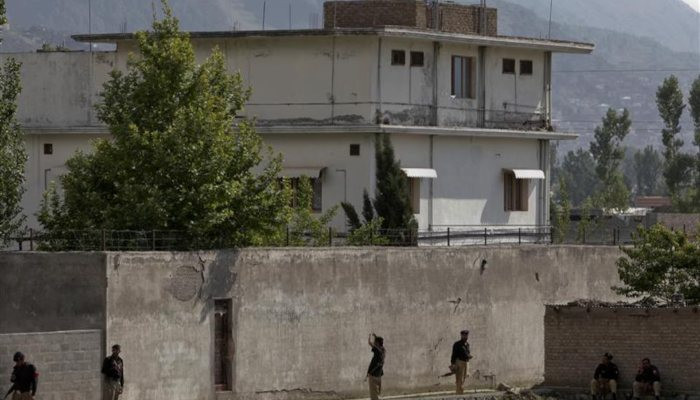Details Emerge on Bin Laden Raid Night
A newly released book chronicling key moments from Asif Ali Zardari’s presidency reveals that a power-sharing agreement between the Pakistan Peoples Party (PPP) and the Pakistan Muslim League-Quaid (PML-Q) was being finalized at the Presidency when US Navy SEALs conducted the raid on Osama bin Laden’s compound in Abbottabad.
Farhatullah Babar, who served as President Zardari’s spokesperson, writes, “The agreement reached its conclusion around 1:30 am on May 2, the same time US Navy SEALs infiltrated the country, attacked the compound, killed Osama bin Laden, and left with his body – revealing to the world that the most wanted terrorist was hiding in a military cantonment in Pakistan.”
According to Babar, Squadron Leader Jalal, the President’s Aide-de-Camp, was possibly the first to suspect unusual activity upon learning from an air force contact about a helicopter crash in Abbottabad. The presence of a helicopter flying at night in the mountainous region raised his suspicions. “He was the first among the President’s staff to be informed about the situation,” Babar stated.
However, Jalal chose to verify the information before informing the President.
Concurrently, the Army House switchboard operator called to inform that the army chief was en route to the Presidency. US President Obama had also contacted Zardari. It is still unclear whether Zardari’s meeting with the army chief had occurred by that time.
The President remained awake throughout the night, initially due to the completion of the power-sharing agreement with the PML-Q, and subsequently because of the Abbottabad incident.
As the Memo-gate scandal unfolded in the aftermath of Osama’s death, leading to Hussain Haqqani’s resignation, Farhatullah Babar, the author of The Zardari Presidency (2008–13), considered releasing a press statement as the spokesperson.
The decision to remove him was made during a meeting at the Prime Minister’s House, attended by Gilani, Zardari, and Kayani. However, Babar uncovered a troubling discovery.
“I found out that my Gmail account had been compromised,” Babar writes. This was more than just hacking; the account was being used maliciously. “During the brief period my account was compromised, the hackers had already disseminated false messages.
One such message falsely claimed that, in a private conversation with a friend, I had admitted that the memo sent to Mike Mullen was authentic. Another falsely stated that I had told a friend the memo was indeed written at Zardari’s request. The FIA (Federal Investigation Agency) was unable to identify the hacker,” Babar writes.
Reflecting on the Raymond Davis affair, Babar recounts that the Americans were eager to secure his release and immediate departure. The reason for this urgency remained unclear. Zardari informed Senator John Kerry, who was in Pakistan for this purpose, that Davis could not be granted immunity because he was not a diplomat.
Even if granted, it would be overruled by the court. He then presented images of religious groups calling for Raymond’s criminal prosecution. Zardari told Kerry, “I don’t want the mullahs to take it to the streets.”
Zardari suggested an innovative solution. When Kerry inquired, he responded, “We need to consider providing appropriate compensation to the families of the victims under Islamic law.” US Ambassador Cameron Munter’s face brightened at this.
“But it’s not automatic. The process will take time.” Munter’s spirits fell again. He was anxious to secure Davis’s release. Eventually, the release was achieved through this approach.



Comments (0)
No comments yet. Be the first to comment!
Leave a Comment